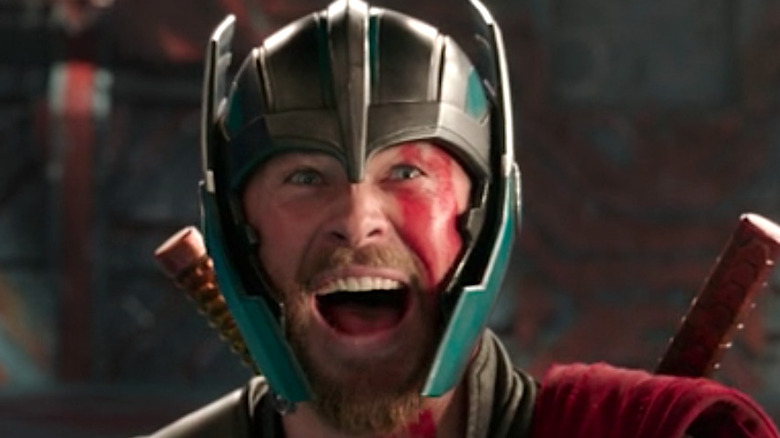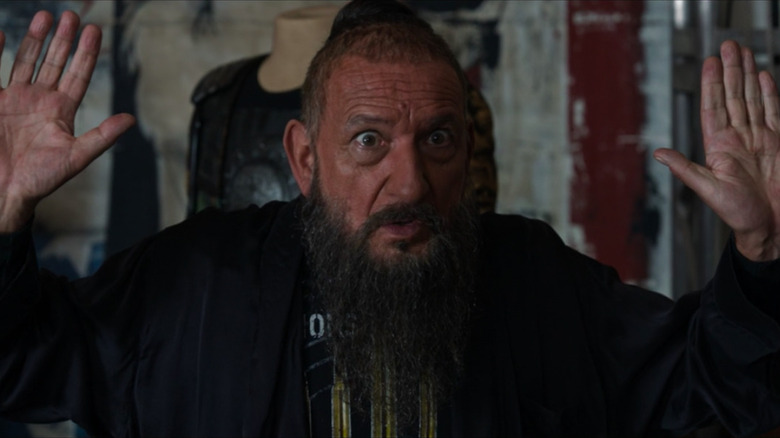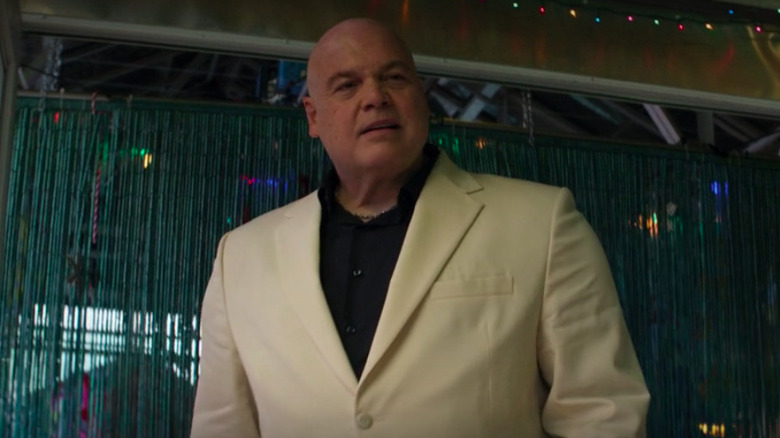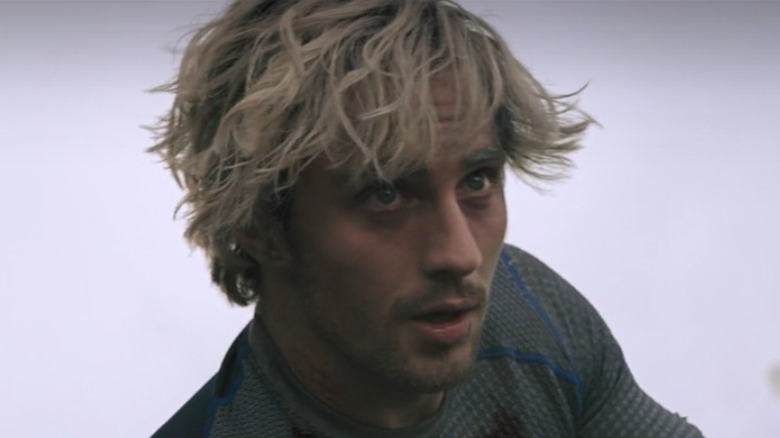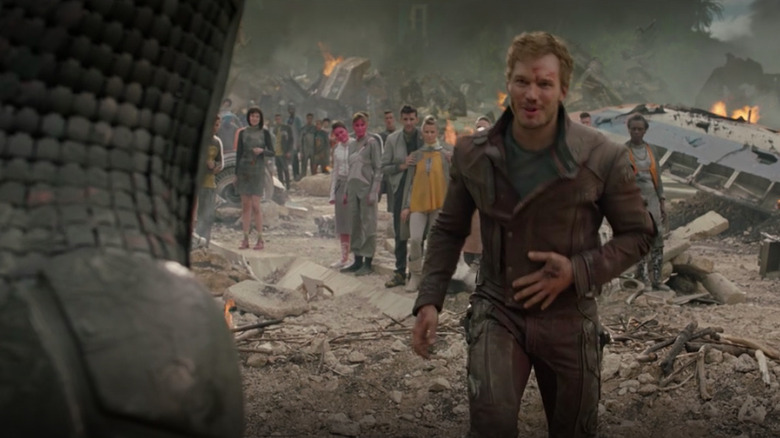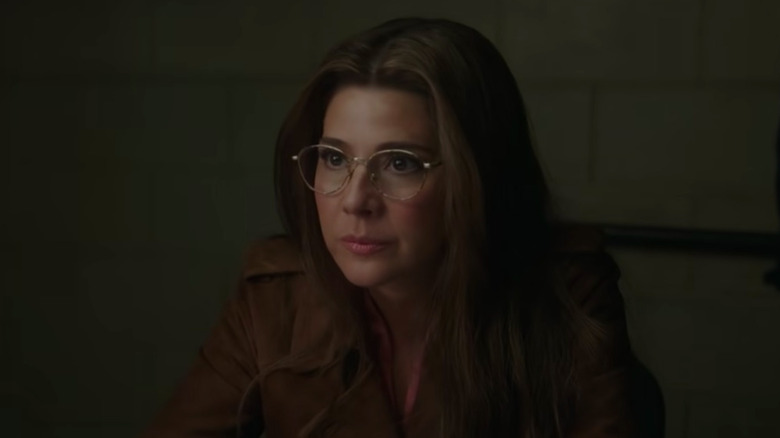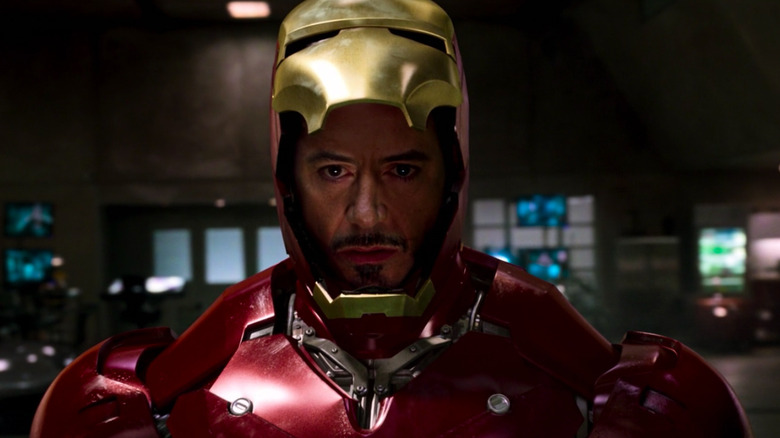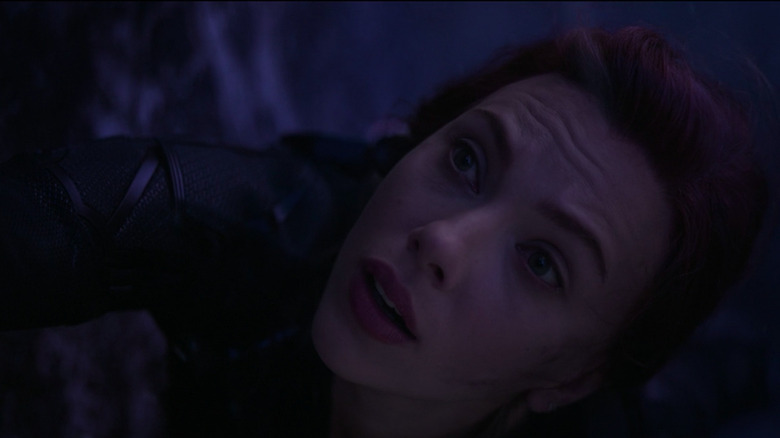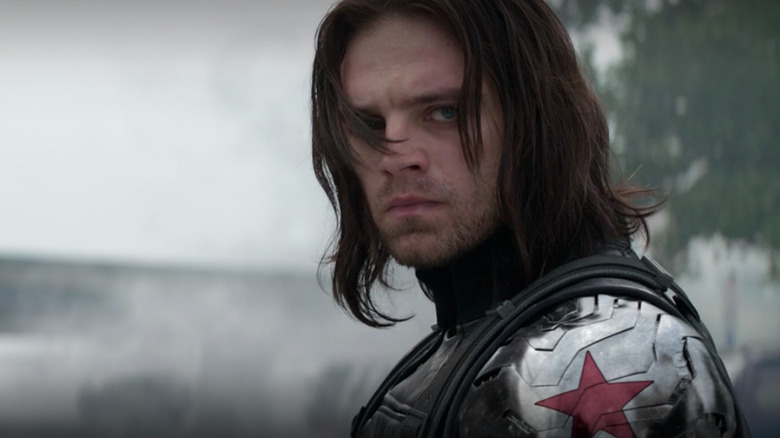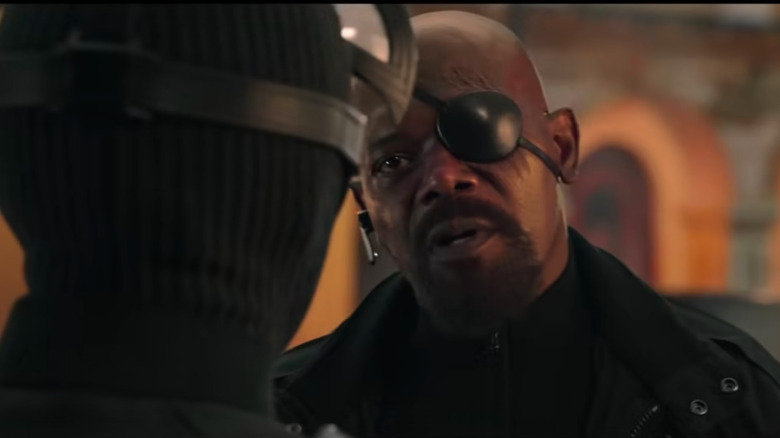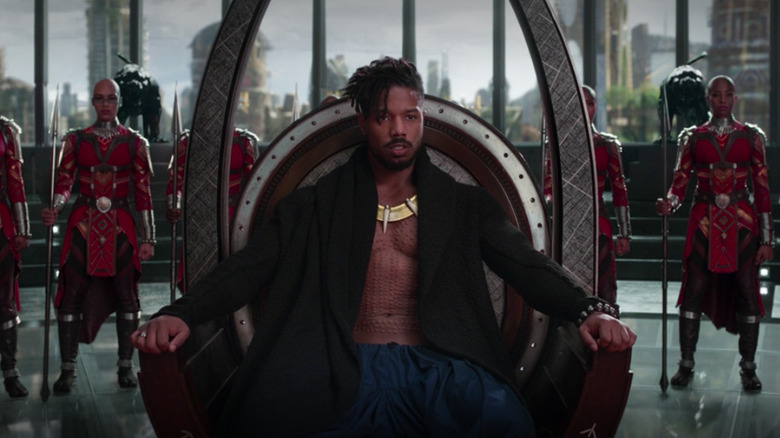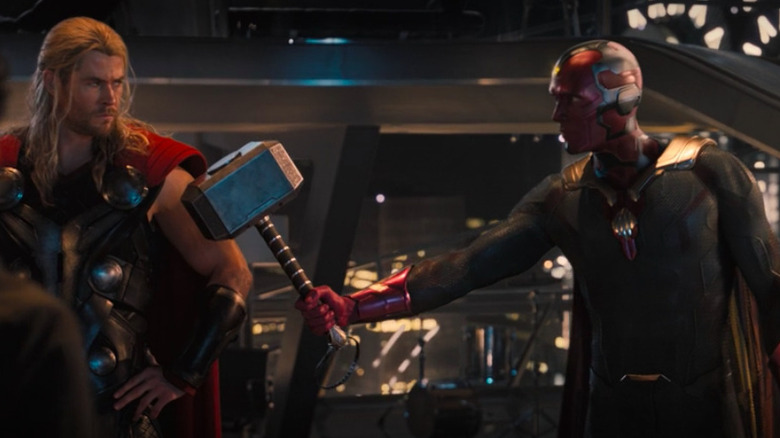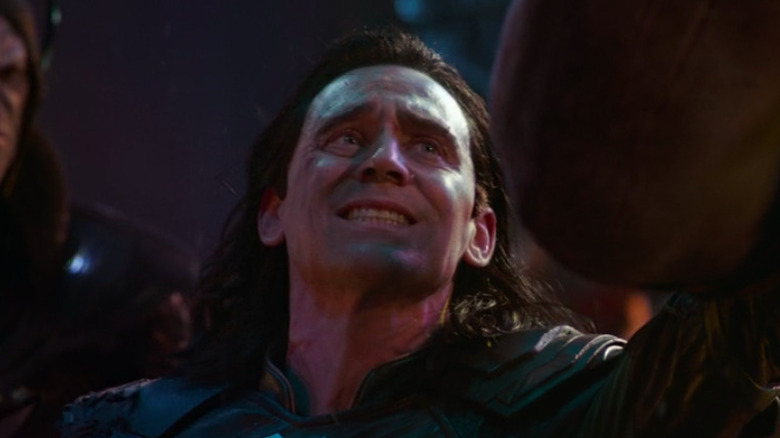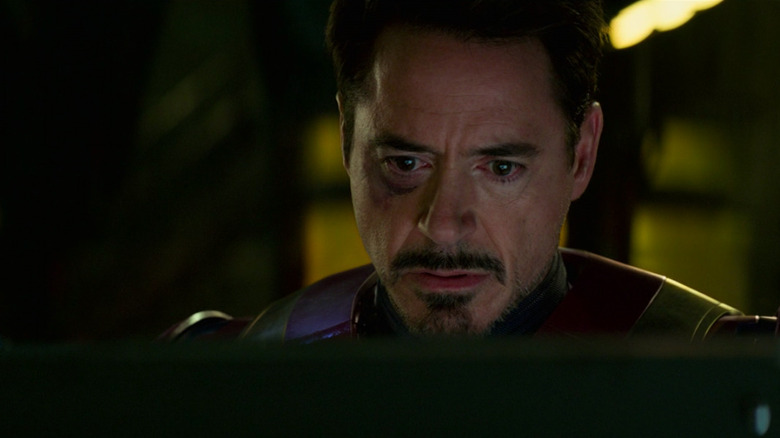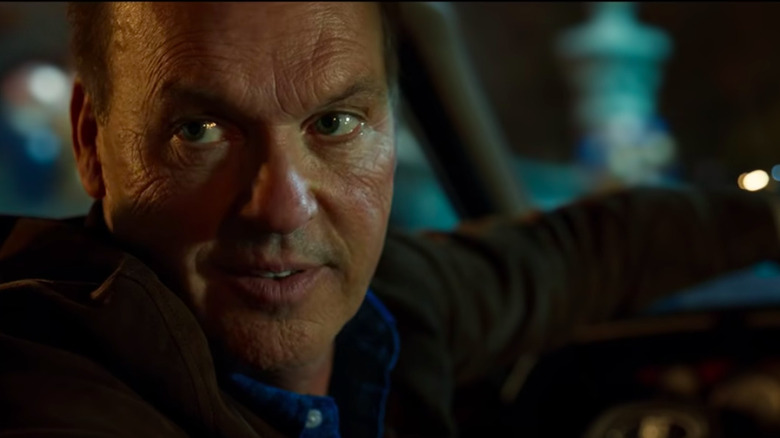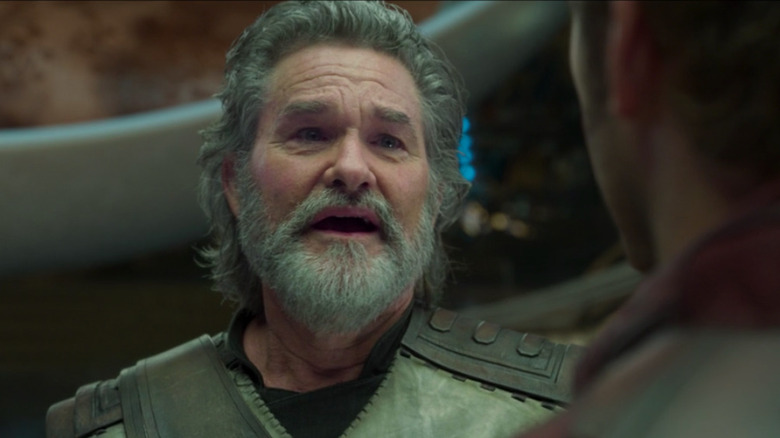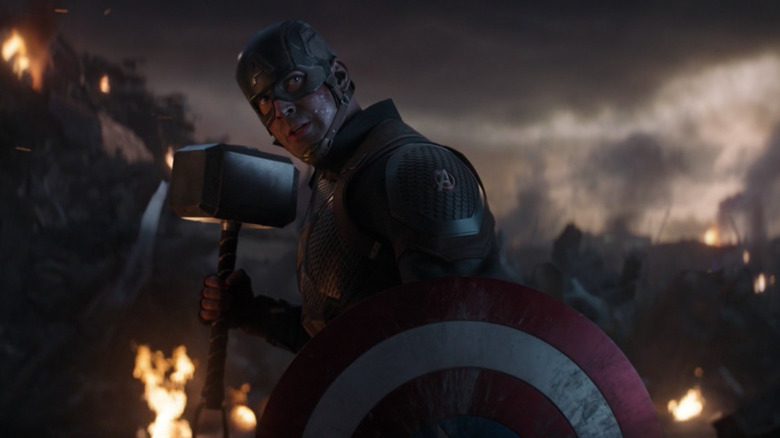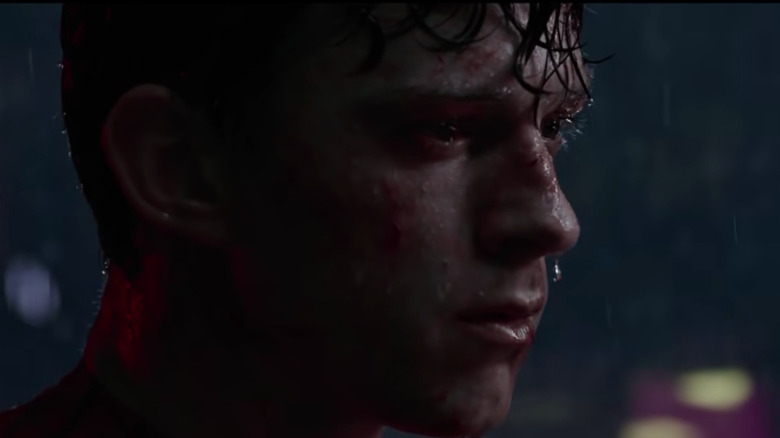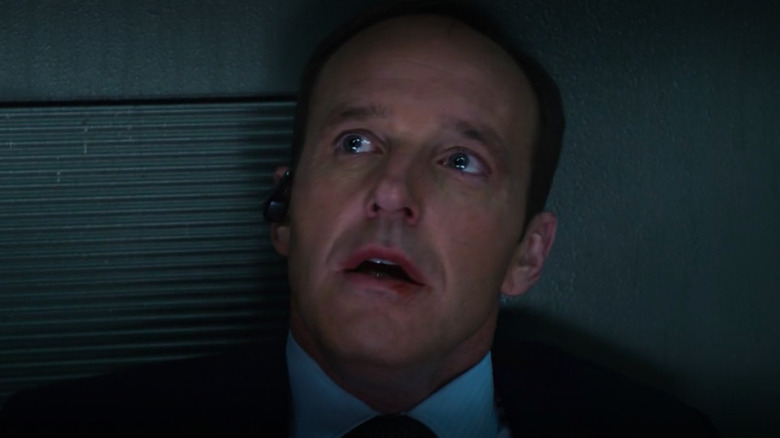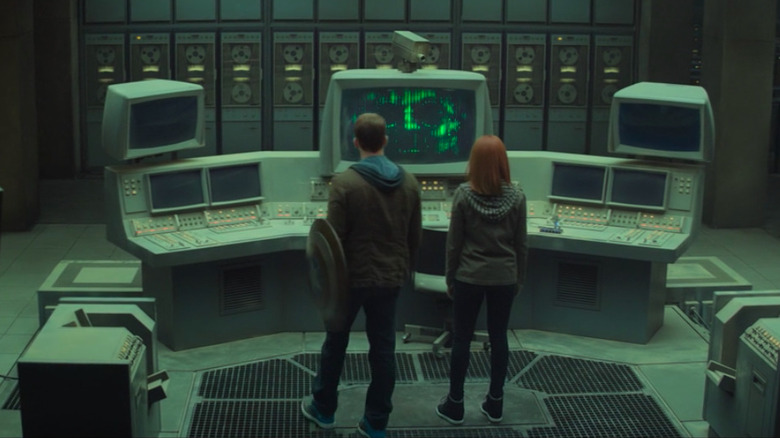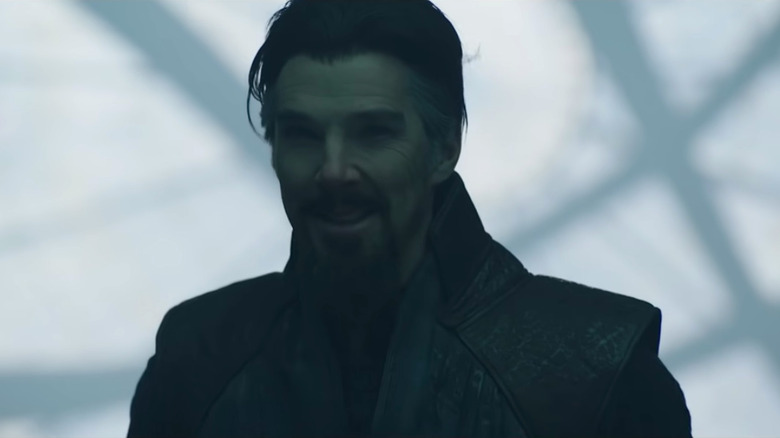The Most Unexpected Things To Happen In The MCU
When the Marvel Cinematic Universe kicked off with "Iron Man" in 2008, few would have predicted that two decades later it would still be going strong. With dozens of movies, plus an ever-expanding roster of TV shows taking us even deeper into the lives of the franchise's various characters, the MCU has reached the point where it has arguably eclipsed any other franchise in terms of size, scope and fanbase.
Yet, somehow the Universe keeps expanding with new characters, new story elements, and new ideas. So, even as fans have become intimately familiar with so many residents of the MCU, its latest movies and TV shows still manage to keep them guessing, whether they're building on revered comic-book storylines, baking in perfectly considered moments of fan service, or finding ways to make viewers fall in love with favorite superheroes all over again.
From "Iron Man" through "Spider-Man: No Way Home" and beyond, filmmakers continue to keep viewers off-guard; it is an undeniable ingredient in the thrill of being an MCU fan. With that in mind, here are the most unexpected things to happen in the MCU thus far.
The Mandarin reveal in Iron Man 3
The big reveal of "Iron Man 3" that the Mandarin's true identity was not who it appeared to be became a polarizing moment in MCU history. Love it or hate it, the Shane Black-engineered moment was one most viewers did not see coming – and nearly a decade later, would become a major plot point in a different MCU film.
When trailers were initially released for the third film in the "Iron Man" series, fans learned the Mandarin would be joining the franchise; a longtime comic book adversary for Iron Man, his appearance felt as inevitable as it was straightforward. Yet, Mandarin had a slippery history when it came to his racial origins in old comic books, and the casting of Oscar winner Sir Ben Kingsley seemed to indicate (for some) a possible whitewashing of the character that might just make matters worse.
Ultimately, Robert Downey Jr.'s Tony Stark discovered the supposed leader of the Ten Rings was an actor named Trevor Slattery, hired to terrorize Stark in the guise of the Mandarin. A self-centered coward who saw the Mandarin as "just a role," he was a smokesecreen for Aldrich Killian (Guy Pearce), the ultimate mastermind behind this particular Mandarin terrorist threat.
While fans were torn about this re-imagining of Iron Man's arch-nemesis, many enjoyed Slattery's antics, and a Marvel One-Shot short depicting his life in prison (and subsequent abduction by the "real" Mandarin) was well-received. Consequently, Marvel surprised fans once again a decade later — by making Kingsley's Slattery a significant supporting character in 2021's "Shang-Chi and the Legend of the Ten Rings," continuing his storyline as a prisoner of the title character's father, the real Mandarin.
Kingpin's return in Hawkeye
As the MCU came to dominate the box office throughout the 2010s, Marvel also made inroads via a separate but parallel world of TV, releasing series like "Agents of SHIELD" on broadcast networks and streaming platforms. While "SHIELD" sometimes reacted to events in Marvel movies (or featured cameos by the likes of Samuel L. Jackson as Nick Fury), a headlines-making partnership with Netflix yielded 6 interrelated "Defenders"-orbiting series that had even less to do with the MCU, occasional references to the Battle of New York notwithstanding.
Nevertheless, "Daredevil," "Jessica Jones," "Luke Cage," and "The Punisher" were largely well-received during their 2015 – 2018 production window, even if "Iron Fist" and "The Defenders" were largely viewed as disappointments. In late 2018/early 2019, the Netflix production partnership was dissolved and the series' axed, seemingly ending such castings as Charlie Cox's Matt Murdock, Jon Bernthal's Frank Castle, Krysten Ritter's Jessica Jones, Mike Colter's Luke Cage and Vincent D'Onofrio's terrifying, nuanced take on Wilson Fisk.
After nearly three years of radio silence on the denizens of Hell's Kitchen, Marvel served up a massive slice of fan service in December of 2021. In a matter of days, Charlie Cox made a cameo as Murdoch in "No Way Home," D'Onofrio appeared on the Disney+ series Hawkeye as Kingpin, and suddenly the MCU seemed open to accepting the discarded Netflix heroes as canon.
While whispered rumors had swirled before the reveal, it was a delightful surprise to see the characters join the MCU — now, fans have their fingers crossed that these reveals could not only lead to more Cox Daredevil and D'Onofrio Kingpin, but also a return of Ritter, Colter, Bernthal and/or other Netflix takes on the beloved characters.
Quicksilver's sacrifice in Age of Ultron
"Avengers: Age of Ultron" may not be the most warmly-regarded MCU outing, but it did offer some unexpected plot points that would shape the MCU.
Chief among them was the death of Pietro Maximoff (Aaron Taylor-Johnson), brother of Wanda (Elizabeth Olsen) — aka Quicksilver and Scarlet Witch, even if they technically weren't called that — who spent most of the movie battling against the Avengers, but ultimately became sympathetic characters. Much like the Mandarin meshugas, this plotline would be revisited nearly a decade later, much to the delight and surprise of MCU fans.
When Pietro died with the line: "You didn't see that coming," it was generally assumed that Quicksilver had taken his final fleet-footed step in the MCU. This might have been for the best, as Evan Peters' take on the same character in the "X-Men" films had been not only more successful and prolific, but also perhaps better received. So, the aftermath of Taylor-Johnson's denouement became not only a formative trauma in the life of Wanda Maximoff — but by the time 2021's "WandaVision" came to fruition, a plotline whose character duality could be manipulated for story potential, as well as MCU viewers' delight.
Quill's dance battle
By now, we all know that since Peter Quill (Chris Pratt) was kidnapped by Ravagers and whisked away to outer space as a child, he's essentially an overgrown adolescent frozen in the intergalactic fantasies of an '80s kid who watched too many movies, breezing from planet to planet, stealing artifacts and hearts as he goes. His obsession with Earth pop culture — fueled largely by the mixtapes his mother left him before her death — has him dancing his way through heists and other Star-Lord adventures of the "Guardians of the Galaxy" and wider MCU films.
However, when he became caught up in a galactic battle between Xandar's Nova Corps and Ronan the Accuser in the original 2014 "Guardians of the Galaxy," most fans were just getting to know the character — and likely expected a final act fueled by weapons, explosions and superpowers ... not dance.
In the film's climactic battle, Quill's quirky qualities serve him well. When confronted by Ronan on Xandar, instead of the explosive fight which fans — and superbeings — would typically expect, Quill instead initiated a dance battle.
Singing and shimmying in front of the warlord, Ronan became so confused that it allowed the other Guardians enough time to blast Ronan and retrieve the Power Stone. It was a memorable exclamation point on Pratt's now-iconic character, and all these years later, the "Guardians" haven't lost their groove.
Aunt May's fate in Spider-Man: No Way Home
The third "Spider-Man" film in the MCU was packed with surprises, from the web-head (Tom Holland) teaming up with counterparts that came in previous Spider-series to a "Venom" series tie-in. But one of the most unexpected moments in "No Way Home" turned out to be much less about the stunt-casting and more about hard-earned audience affection for an ill-fated character.
In "Spider-Man" series prior to the MCU, the death of Uncle Ben had always been a catalyst for the raison d'etre of the friendly neighborhood webslinger. But without a Ben in his origin story, Holland's Peter had instead been in the care of Aunt May (Marisa Tomei) — and had seemed to discover his fate without a comparable tragedy; well, until now.
When May encourages Peter to help the villains who have arrived in the MCU from alternate universes instead of sending them home to die, Peter follows her advice. But when Green Goblin takes control of Norman Osborn's body, Aunt May pays the price. Among her final words? "With great power, there must come great responsibility."
Tony Stark confirms he's Iron Man
Pop culture has been telling us for more than three-quarters of a century that superheroes must keep their identities hidden — the concept even pre-dates Superman, stretching back to heroes like Zorro, the Lone Ranger and the Scarlet Pimpernel. So, viewers took it for granted in 2008, when the original "Iron Man" film came out, that Robert Downey Jr.'s Tony Stark would do everything in his power to keep Iron Man's true identity on the down-low.
But the movie ended with Stark addressing the world's media at a press conference, distancing his gaze from the index cards in his hand and announcing instead with a twinkle in his eye that "I am Iron Man." It was not only an early signal that the MCU was willing to take big swings and diverge from the superhero playbook, but also spoke volumes about the nature of this cocksure hero. Stark simply isn't the alter-ego type, and in hindsight, his inability to stop himself from taking credit for Iron Man was perfectly in keeping with who he'd become.
Hawkeye and Black Widow fight to the death
Many fans went into "Avengers: Endgame" expecting the conclusion of the saga to be the most high-stakes MCU outing yet. Thanos (Josh Brolin) had snapped half of mankind out of existence, and rumors had been circulating for some time that it night be the last Marvel film for Downey and/or Chris Evans. Yet, the trauma and tragedy of what came next was largely unexpected — and would have repercussions that continue to echo through the MCU today.
When Natasha Romanoff (Scarlett Johansson) and Clint Barton found themselves in Vormir during the movie's time heist, they were faced with the prospect of a love sacrifice required to retrieve the Soul Stone. The two noble heroes each had their own reasons for wanting to give their lives for the cause, and the unexpectedly heartbreaking result was seeing these best friends' fierce fight to the death.
While Barton does his best to sacrifice himself, Natasha is ultimately the victor, heroically accepting her demise. Even though Barton retrieves the Soul Stone, there are no winners in this battle, a point made clear again years later in the "Hawkeye" TV series.
Bucky Barnes is the Winter Soldier
One of the most harrowing moments in the MCU occurred when Steve Rogers' (Chris Evans) best friend Bucky Barnes (Sebastian Stan) was killed in action during World War II in "Captain America: The First Avenger." Evans and Stan had created such a believable relationship in that first Joe Johnston-helmed "Captain America" film, and it made Cap's loss feel overwhelming.
Those who hadn't read the comics — and those who knew the MCU didn't always follow their lead — were afraid that audiences may have seen the last of Cap's eager-to-please sidekick. So it turned out to be a welcomed surprise when the title villain in "Captain America: The Winter Soldier" was revealed as Cap's long-lost friend.
Steve's astonishment reflected the feelings of many viewers, especially since the movie was set decades after Steve had last seen Bucky. The revelations came fast and furious as Bucky was not only alive and looking young, but also working for HYDRA. Naturally, Steve and Bucky's previously-established friendship helped goose the rest of the movie, making the pair's climactic confrontation all the more poignant.
Nick Fury was a Skrull in Far From Home
Nick Fury (Samuel L. Jackson) was an integral part of the plot of "Spider-Man: Far From Home." he was the one who sought Peter Parker out while he was visiting Europe, recruiting him to team up with Quentin Beck (Jake Gyllenhaal), the up and coming superhero known as Mysterio, to stop the Elementals. Following the collapse of S.H.I.E.L.D., Fury was depicted as having been driven into the shadows, but doing his best to continue to enlist superheroes to eliminate ongoing threats to the world.
So, how shocking was it to learn that Nick Fury ... wasn't Nick Fury at all?
The film's post-credits scene brought with it the revelation that Fury may have been less invested in protecting Earth than the rest of the movie led fans to believe. It showed Fury and his loyal associate Maria Hill changing into the forms of the Skrulls Talos (Ben Mendelsohn) and Soren (Sharon Blynn). Their conversation then revealed that Fury had deployed the shape-shifting aliens to do his job while he took some much need R & R. Even the most die-hard government agents, it seems, needs a vacation every now and then.
Killmonger reveals he's Wakandan royalty
While many of the villains of the MCU haven't made much of an impression (it has been one of the few persistent knocks on the movies since the beginning), Michael B. Jordan's take on Eric Killmonger in "Black Panther" proved to be one of the exceptions. For the first half of the film, the character seemed to be an American mercenary after vibranium; ultimately it was revealed that he had been playing a long game, patiently waiting for an excuse to enter Wakanda, where the now grown-up nephew T'Chaka left in America could ascend to the throne.
Even though he was willing to destroy and kill to get what he wanted, Killmonger's circumstances and his desire to carry on his father's mission to help the oppressed made him impossibly sympathetic. In fact, the fate that awaited him was probably met by as much disappointment from MCU fans as any sense of triumphant comeuppance. As a result, the character remains one of the MCU's most potent and memorable villains.
Vision picks up Thor's hammer
It's funny how a seemingly throwaway scene in 2015's "Avengers: Age of Ultron" ultimately became the one best remembered from the film. Perhaps it's because the moment was thrilling, quite funny and would later pay off with a major reward — all emblematic of the unique formula MCU films tap into at their finest moments.
During a party at Stark Tower early in the film, the Avengers jokingly, drunkenly attempted to lift Thor's hammer, Mjolnir. As we all know, the ability to wield the hammer isn't just a simple matter of strength — the individual has to be worthy to do so, with a combination of heroic qualities that Mjolnir can magically detect. So, it came as no surprise when the hammer wouldn't budge for Thor's teammates.
Later in the movie, it's revealed there's one character besides Thor (Chris Hemsworth) who can handle Mjolnir — he just didn't exist yet.
After stealing a synthetic body Ultron had created for himself, Stark and Banner uploaded Stark's loyal A.I. program J.A.R.V.I.S. into it, with Thor channeling the lightning necessary to activate the body. Of course, many of the Avengers were suspicious of this new being they dubbed Vision (Paul Bettany). After all, he had at least some of Ultron's consciousness inside him, so how could he possibly be trusted?
While Vision calmly tried to convince the Avengers he was on the side of life, it wasn't until he encouraged the team to take on Ultron — and unexpectedly handed Thor his hammer — that the surprised team realized Vision truly was their ally. And a highly worthy one at that.
The death of Loki
It seemed inevitable that at least one or two characters wouldn't make it through "Infinity War," yet few could have predicted the movie opening with the slaughter of at least half of what remained of Asgard — and the main villain of the MCU up until that point.
After Thor's home was destroyed during the events of "Thor: Ragnarok," the citizens who remained behind sailed into space, only to encounter Thanos and his followers. The sequence became even more shocking when the newly reformed Loki (Tom Hiddleston) attempted to kill Thanos, only to be strangled by the Mad Titan.
Of course, Loki had appeared to perish multiple times in the MCU already and had always resurfaced, because what looked like death had only been a clever trick. So when Loki appeared to perish in "Infinity War," it was easy to hope that it was just another ruse. Thanos quickly dashed those hopes, however, by saying there wouldn't be any resurrections for Loki this time, leading fans to the unexpected but inevitable conclusion that the character really was gone.
Thankfully, through a mix of time travel and multiversing, Loki would eventually live on in a self-titled Disney+ series. But that didn't lessen the pain of losing the Loki who went through "Ragnarok" in "Infinity War."
Tony learns Bucky killed his parents
In "Captain America: Civil War" Helmut Zemo (Daniel Bruhl) went to work employing what he knew about the Avengers to tear them apart. Key to his plan was showing Tony Stark a video from the night in 1991 when his parents died in a car crash; it showed that their deaths happened at the hands of Bucky Barnes, acting on behalf of HYDRA as the Winter Soldier.
While viewers had seen Bucky being sent to carry out the Starks' executions earlier in the film, the knowledge he had killed them was trumped by the heart-pounding slow-burn sequence where Tony learned the truth. Viewers, Captain America, and Bucky had all hoped Tony wouldn't find out, given it wouldn't do him or the other Avengers any good, and it was gut-wrenching to see Cap and Iron Man turn on each other in a moment when Stark was grieving his parents' deaths all over again. For Zemo, however, the moment seemed to represent the final triumphant nail in the coffin of the Avengers.
The Vulture is Peter's date's dad
Much of "Spider-Man: Homecoming" was about Peter Parker figuring out how to be a superhero. Peter may have had the Spidey moves and an eagerness to help, but his recklessness manifested itself in a frequent inability to keep cool under pressure.
So when Peter picked up his crush Liz (Laura Harrier) at her house for the homecoming dance, he was as shocked as the audience when Adrian Toomes (Michael Keaton), the illegal arms dealer he had been trying to stop (and who had developed a Vulture suit out of alien technology) was revealed as Liz's father. Could he keep his wits and get out of the situation with his life, secret identity, and prom date intact?
The moment is magnificently orchestrated by director Jon Watts, who builds tremendous tension with things as simple as rear-mirror close-ups and the shades reflected from street lights. On the surface, it appears as though Parker still has the advantage; as with any Keaton character, however, this man is no fool. You can see the wheels turning in his mind as the light of recognition finally illuminated the deadly confrontation to come.
Ego reveals he killed Quill's mother
Peter Quill lost his mother to cancer at a young age and never knew his father ... until "Guardians of the Galaxy 2," when he would learn that his father was the Celestial Ego the Living Planet (Kurt Russell), and that he is in possession of the same extraordinary powers as his dad. Initially, Ego came across as the warm parent Quill had been missing for most of his life — but eventually, his true nature became known.
Ego revealed that he was responsible for causing Quill's mother's illness and death, something neither Quill nor viewers expected. After all, Ego had claimed he loved Quill's mother. Yet, as Ego himself would point out, when you're a Celestial who is thousands of years old and only getting older, you don't experience love like a mere mortal. In Ego's mind, this may have made his actions reasonable — but for Peter, Ego was responsible for all the awful things that had occurred during his formative years.
Captain America lifts Thor's hammer
Looking back at the breadth of the MCU, there have certainly been plenty of fan-service moments. But it's hard to think of one that garnered more applause and excitement than the "Age of Ultron" callback when captain America proved himself worthy.
Back in that aforementioned film, Thor was amused by the antics of his teammates as they attempted to wield his signature weapon. That amusement was clearly a product of Thor's confidence that only he was truly worthy of Mjolnir. After all, in 2011's "Thor," even the Norse god himself was unable to lift the hammer until he let go of his arrogance and cultivated the qualities that have since made him a true hero.
By the time "Avengers: Endgame" arrived, the stakes had become so much higher, as the team tried desperately to restore the half of all life that Thanos had snapped away. So when the trio of Thor, Cap, and Iron Man confronted Thanos, with the Mad Titan moments from overcoming Thor, Cap's revelation that he may have been more worthy than he let on back in "Ultron" brought joy to both Thor and viewers. Thor's breathless response, "I knew it!" said it all.
Peter Parker's decision to have the world forget him
Given all the battles he's fought in the MCU, it's easy to forget that Peter Parker is still a child. So when the revelation of his identity as the man behind Spider-Man compromised the college acceptances of him and his friends in "Spider-Man: No Way Home," it made sense that he wouldn't think through all the possibilities to remedy the situation — and that Doctor Strange wouldn't double check that Peter had exhausted every other option before coming to him for a magical solution to his problem.
Unfortunately, by the time Strange completed the spell to make the world forget Parker was Spider-Man, things had gone haywire and the door had been opened to other universes. It would be a mess that could only be undone with a very adult decision.
By the end of the film, Peter had worked with Strange to make everyone forget about him. It was a choice that left him isolated, alone, and clearly entering a new era for the hero.
The death of Phil Coulson
"The Avengers" was the first time Marvel's various superheroes teamed up on the big screen, so perhaps viewers could be forgiven for focusing on the thrill of it all and not on the possibility that the characters would spend much of the movie in mortal peril. Given the excitement of seeing the team assemble for the first time, fans didn't anticipate becoming so emotionally drawn in by Phil Coulson (Clark Gregg), Nick Fury's right-hand man and a reliable presence throughout multiple Phase 1 MCU films — who ended up on the wrong side of Loki's scepter.
Coulson's death gave the film real stakes, and the uneasy team of superheroes something to rally around. For fans who loved the steadfast agent, Coulson's demise gave "The Avengers" extra emotional punch. Of course, he went on to lead the TV show "Agents of S.H.I.E.L.D.," making Coulson not only one of the first iconic MCU characters to die, but also possibly the first to be resurrected.
HYDRA is revealed to be embedded in S.H.I.E.L.D.
Nick Fury and S.H.I.E.L.D. became major forces throughout the first many MCU movies. Throughout that time, fans had been led to believe the organization was a force for good — as did the Avengers. Such clear lines of good and evil came crashing down with "Captain America: The Winter Soldier," however, amidst revelations that for decades a parasite had been feeding on S.H.I.E.L.D. from the inside.
When Captain America and Black Widow went to seek answers at a S.H.I.E.L.D. facility, they found themselves in an underground lair. There, a computer fired up, with HYDRA scientist Arnim Zola revealing himself — or at least, a computerized conscience of him — and explaining HYDRA's decades of work within S.H.I.E.L.D., an admission that allowed him to brag while distracting the heroes from the missiles on their way to destroy the facility.
Doctor Strange confronts his dark doppelganger
The end credit sequence in "Spider-Man: No Way Home" turned out to be the teaser trailer for "Doctor Strange in the Multiverse of Madness," and the clip indicated the film would be packed full of sorcery, intriguing places, and fascinating characters. Yet, the most unexpected moment in the teaser may have come at the end, when the MCU's Doctor Strange found himself confronted by a dark version of himself from another universe.
What was particularly tantalizing about this brief glimpse was that he appeared to be the same iteration of the character that was the focus of Episode 4 of Disney+'s animated "What If...?" series.
That show, of course, explored MCU characters in alternate universes, so this surprise look at a dark Doctor Strange suggested that the twisted animated character could possibly cross over into the MCU's main timeline to wreak all sorts of havoc. Here's looking forward to more unexpected MCU happenings, in "Multiverse of Madness" and beyond.
